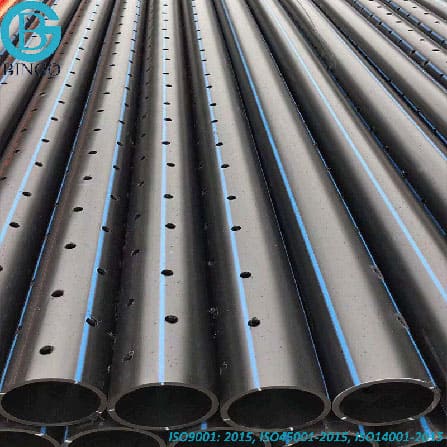Comprehending the Secret Benefits of HDPE Pipeline for Water and Wastewater Management
The usage of HDPE pipe in water and wastewater monitoring presents numerous benefits that merit consideration. Its phenomenal sturdiness and lengthy lifespan make it a favored selection for numerous projects. Additionally, the material's resistance to deterioration and chemical damage improves its integrity in various environments. The advantages expand beyond just durability and resistance. Midland TX HDPE Pipe Fittings in Stock. Exploring its cost-effectiveness and environmental effect discloses even much more engaging factors for its extensive fostering in modern framework
Remarkable Sturdiness and Durability

HDPE pipeline sticks out for its remarkable toughness and durability, making it a favored choice in water management systems. Constructed from high-density polyethylene, these pipelines can withstand considerable stress and stress, ensuring dependable efficiency in time. Their robust nature allows them to endure extreme ecological problems, consisting of temperature level fluctuations and dirt motions, which can trigger various other materials to fail.
The lifespan of HDPE pipes usually goes beyond 50 years, offering an affordable solution for municipalities and industries alike. Additionally, the material's lightweight buildings streamline setup, reducing labor costs and durations. This toughness minimizes the demand for regular fixings or replacements, additionally enhancing its financial appeal.
In water management applications, the dependability of HDPE pipelines indicates fewer disturbances and improved solution continuity, making them integral to lasting framework growth. The combination of resilience and long life strengthens HDPE's role as a keystone in reliable water monitoring solutions.

Resistance to Corrosion and Chemical Damage
While many products catch rust and chemical damages gradually, HDPE pipelines exhibit exceptional resistance, making them ideal for numerous water administration applications. This durability stems from the molecular structure of high-density polyethylene, which is inherently non-reactive and does not rust like steels or deteriorate from direct exposure to rough chemicals. As an outcome, HDPE is highly efficient in environments with aggressive substances, such as wastewater systems that may contain acids, bases, and natural solvents.
Additionally, HDPE pipelines can endure ecological elements such as dirt acidity and saline conditions, even more boosting their suitability for varied applications (Midland TX HDPE Pipe Fittings in Stock). Their capacity to keep structural stability over time decreases the danger of leakages and failings, which is crucial in making certain the security and reliability of water distribution and wastewater monitoring systems. Consequently, the resistance to rust and chemical damage markedly adds to the overall efficiency and durability of HDPE piping options
Cost-Effectiveness and Economic Advantages
When considering the financial implications of water administration systems, the cost-effectiveness of HDPE pipes becomes evident. These pipelines provide reduced installation and maintenance expenses compared to traditional products like steel or concrete. Their lightweight nature streamlines transportation and setup, leading to decreased labor expenditures. Additionally, HDPE pipes display a long life-span, often surpassing 50 years, which translates to fewer substitutes and long-term savings.
Moreover, the resistance of HDPE to deterioration and chemical damages lessens the need for costly fixings and replacements. The pipelines also support efficient water flow, reducing energy costs connected with pumping systems. By mitigating leaks and water loss, HDPE pipelines contribute to substantial financial benefits for districts and industries alike. Overall, the preliminary investment in HDPE piping can yield substantial financial returns over the lifespan of the water monitoring system, making it a prudent choice for sustainable facilities advancement.
Environmental Sustainability and Lowered Impact

Convenience and Adaptability in Setup
Due to their one-of-a-kind homes, HDPE pipes provide impressive flexibility and adaptability in installation, making them appropriate for a vast array of applications. Their light-weight nature enables easier handling and transportation, decreasing labor expenses and setup time. HDPE pipelines can be bent and shaped to fit different terrains and job needs, which is particularly valuable in testing atmospheres.
Furthermore, their resistance to rust and chemical damages enables setup in varied setups without the demand for specialized safety finishes. The capacity to fuse joints produces a constant, leak-free system, enhancing the general honesty and dependability of the setup. HDPE's versatility likewise suits ground activity, reducing the risk of damage in areas susceptible to changing dirt. On the whole, these attributes make HDPE pipes not only functional however also a favored choice for water and wastewater administration systems.
Frequently Asked Inquiries
Exactly How Does HDPE Pipe Compare to PVC in Water Monitoring Applications?
HDPE pipe supplies remarkable flexibility, resistance to deterioration, and sturdiness compared to PVC. Its lighter weight assists in easier installation, while its lengthy life-span lowers substitute costs, making HDPE a recommended choice in water monitoring applications.
What Is the Life-span of HDPE Pipes Under Typical Conditions?
Under normal conditions, HDPE pipelines can have a life-span ranging from 50 to 100 years. Their longevity and resistance to deterioration contribute to their long-lasting efficiency in numerous applications, making them a dependable selection for facilities.
Are HDPE Water Lines Recyclable After Their Service Life?
Yes, HDPE pipes are recyclable after their life span. Pipe Supplier American Plastics Midland. They can be processed and repurposed into new click for more info products, considerably reducing ecological influence and advertising sustainability within the market, making them an eco-friendly option for piping options
What Is the Installation Refine for HDPE Pipes?
The setup process for HDPE pipes includes website preparation, trenching, pipe fusion or mechanical signing up with, backfilling, and stress screening. Appropriate techniques assure a durable and efficient system for delivering water and wastewater effectively.
Can HDPE Piping Be Made Use Of for Both Drinkable and Non-Potable Water Systems?
Yes, HDPE pipelines can be used for both potable and non-potable water supply. Their flexibility, sturdiness, and resistance to rust make them suitable for various applications, making certain secure and effective transportation of water in various contexts.